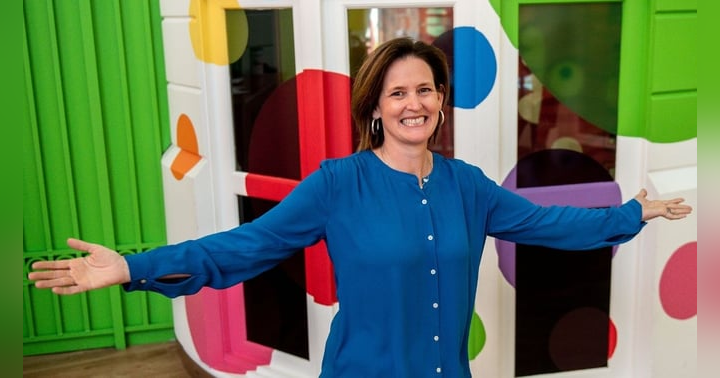
In today's fast-paced world, it's easy to get lost in the noise. Nonprofits and professionals alike struggle to connect with their target audience, often resorting to traditional marketing tactics that fall flat. But what if there was a way to cut through the clutter and forge genuine connections? The answer lies in the power of storytelling. In this blog post, we'll explore how storytelling can be a game-changer for nonprofits and professionals, enabling them to make a lasting impact. We'll also delve into how Maria Chapman's Connected Ghostwriting leverages the art of narrative to help these organizations achieve their goals. This topic is near and dear to me, and connects directly to my recent conversation with Maria on the Conversations with Rich Bennett podcast, where we explored her incredible journey. We hope you enjoy this exploration of how powerful stories can change the world.
Introduction: The Untapped Potential of Storytelling
Storytelling is as old as humanity itself. From ancient cave paintings to modern-day blockbuster movies, stories have always been a powerful way to communicate, educate, and entertain. But beyond entertainment, stories have the unique ability to evoke emotions, build empathy, and inspire action. In the context of nonprofits and professionals, this translates to a powerful tool for connecting with their audience on a deeper level.
Traditional marketing often relies on facts, figures, and features. While this information is essential, it often fails to resonate with people on an emotional level. Storytelling, on the other hand, speaks directly to the heart. By crafting compelling narratives, nonprofits can illustrate the impact of their work, while professionals can showcase their expertise and build trust with potential clients.
The untapped potential of storytelling lies in its ability to transform the way nonprofits and professionals communicate. By shifting from a focus on information to a focus on connection, these organizations can create meaningful relationships with their audience, driving engagement, fostering loyalty, and ultimately achieving their goals.
Maria Chapman's Inspiring Journey: From Adversity to Advocacy
Maria Chapman's story is a testament to the power of resilience and the transformative impact of turning personal adversity into advocacy. After being medically retired due to rare neuromuscular conditions, Maria faced a challenging crossroads. Instead of succumbing to despair, she channeled her energy and passion into writing, building a new life and a thriving business.
Maria's journey began with a deep understanding of her own experiences. Living with chronic inflammatory demyelinating polyradiculoneuropathy (CIDP) and myasthenia gravis presented significant obstacles, but these challenges also gave her unique insights into the struggles faced by disabled individuals. She realized that many disabled entrepreneurs lacked the resources and support they needed to succeed.
Fueled by a desire to make a difference, Maria founded Connected Ghostwriting, a company that leverages the power of narrative to amplify the voices of nonprofits and professionals. She also launched Journey to Success, a nonprofit dedicated to helping disabled entrepreneurs build sustainable businesses. Through these ventures, Maria has become a powerful advocate for resilience, inclusive entrepreneurship, and the importance of storytelling.
Maria's story is an inspiration to anyone facing adversity. It demonstrates that with determination, creativity, and a commitment to helping others, it is possible to overcome challenges and achieve remarkable things. Her journey is a reminder that even in the face of hardship, we all have the potential to make a positive impact on the world.
Connected Ghostwriting: Amplifying Voices Through Narrative
Connected Ghostwriting is more than just a writing agency; it's a mission-driven organization that believes in the power of storytelling to drive positive change. Maria Chapman founded Connected Ghostwriting with the goal of helping nonprofits and professionals connect with their audience, share their message, and achieve their goals.
The agency specializes in crafting compelling narratives that resonate with readers on an emotional level. Whether it's writing website copy, blog posts, articles, or even entire books, Connected Ghostwriting approaches each project with a deep understanding of the client's mission and target audience.
What sets Connected Ghostwriting apart is its commitment to collaboration and authenticity. The team works closely with clients to understand their unique story and help them articulate their message in a way that is both engaging and impactful. They believe that the best stories are those that come from the heart, and they are dedicated to helping their clients share their authentic voice with the world.
By amplifying the voices of nonprofits and professionals, Connected Ghostwriting helps these organizations build trust, establish credibility, and ultimately make a greater impact on the communities they serve.
How Storytelling Empowers Nonprofits and Professionals
Storytelling is a powerful tool that can empower nonprofits and professionals in various ways. For nonprofits, storytelling can help to:
- Raise awareness: By sharing stories of the people they serve, nonprofits can bring attention to important issues and inspire others to get involved.
- Increase donations: Compelling narratives can tug at the heartstrings and motivate people to donate to a cause they care about.
- Build relationships: Storytelling can help nonprofits connect with their donors, volunteers, and beneficiaries on a deeper level, fostering stronger relationships.
- Advocate for change: By sharing stories of injustice or inequality, nonprofits can raise awareness of systemic issues and advocate for policy changes.
For professionals, storytelling can help to:
- Build trust: Sharing personal stories or case studies can help professionals build trust with potential clients and demonstrate their expertise.
- Establish credibility: By showcasing their experience and accomplishments through storytelling, professionals can establish themselves as thought leaders in their field.
- Connect with clients: Storytelling can help professionals connect with their clients on a more personal level, building rapport and fostering stronger relationships.
- Differentiate themselves: In a crowded marketplace, storytelling can help professionals stand out from the competition and attract new clients.
In both cases, storytelling provides a powerful way to connect with audiences, build relationships, and drive positive change. By harnessing the power of narrative, nonprofits and professionals can achieve their goals and make a lasting impact on the world.
Journey to Success: Supporting Disabled Entrepreneurs
Journey to Success is a nonprofit organization founded by Maria Chapman with a specific mission: to support disabled entrepreneurs in building sustainable businesses. Recognizing the unique challenges faced by individuals with disabilities in the entrepreneurial world, Journey to Success provides resources, mentorship, and community support to help these entrepreneurs thrive.
The organization offers a variety of programs and services designed to address the specific needs of disabled entrepreneurs. These include:
- Business training: Workshops and seminars on topics such as business planning, marketing, and financial management.
- Mentorship: One-on-one coaching from experienced entrepreneurs and business professionals.
- Networking: Opportunities to connect with other disabled entrepreneurs and build a supportive community.
- Access to funding: Grants and loans to help entrepreneurs start or grow their businesses.
- Assistive technology: Support in accessing and utilizing assistive technology to overcome physical or cognitive barriers.
Journey to Success believes that everyone deserves the opportunity to pursue their dreams, regardless of their disability. By providing the resources and support that disabled entrepreneurs need to succeed, the organization is empowering individuals to create their own economic opportunities and build a more inclusive society.
Overcoming Challenges: Maria's Strategies for Resilience
Maria Chapman's journey is a powerful example of resilience in the face of adversity. Living with chronic inflammatory demyelinating polyradiculoneuropathy (CIDP) and myasthenia gravis presents daily challenges, but Maria has developed a number of strategies to cope with these challenges and maintain a positive outlook.
Some of Maria's key strategies for resilience include:
- Focusing on what she can control: Maria understands that she cannot control her medical conditions, but she can control how she responds to them. She focuses on making healthy choices, managing her symptoms, and staying positive.
- Building a strong support system: Maria relies on her family, friends, and community for support. She also connects with other people who have similar conditions, sharing experiences and offering encouragement.
- Setting realistic goals: Maria breaks down her goals into smaller, more manageable steps. This allows her to celebrate small victories and stay motivated.
- Practicing self-care: Maria makes time for activities that she enjoys, such as reading, writing, and spending time in nature. She also prioritizes rest and relaxation to manage stress.
- Giving back to others: Maria finds purpose and fulfillment in helping others. By sharing her story and supporting disabled entrepreneurs, she is making a positive impact on the world.
Maria's strategies for resilience are applicable to anyone facing challenges in their life. By focusing on what they can control, building a strong support system, setting realistic goals, practicing self-care, and giving back to others, individuals can overcome adversity and thrive.
Pivot, Don't Quit: Redefining Success on Your Own Terms
One of the key lessons Maria Chapman has learned throughout her journey is the importance of adapting to change and redefining success on her own terms. When faced with unexpected challenges, it's easy to become discouraged and give up. However, Maria believes that it's essential to "pivot, don't quit."
Pivoting involves shifting your strategy or approach while still pursuing your overall goals. It means being flexible, adaptable, and willing to try new things. For Maria, pivoting meant transitioning from a career in healthcare to becoming an entrepreneur and advocate.
Redefining success means challenging traditional notions of what it means to be successful and creating your own definition based on your values and priorities. For Maria, success is not just about making money; it's about making a positive impact on the world and helping others achieve their dreams.
By embracing the "pivot, don't quit" mentality and redefining success on her own terms, Maria has been able to overcome challenges, achieve her goals, and live a fulfilling life. This message is a powerful reminder that success is not a fixed destination, but rather a journey of continuous growth and adaptation.
Resources and Support: Where to Find Help and Inspiration
If you're feeling inspired by Maria Chapman's story and want to learn more about storytelling, entrepreneurship, or disability advocacy, there are many resources and support systems available.
Here are some helpful resources:
- Connected Ghostwriting: connectedghostwriting.com - Learn more about Maria Chapman's writing agency and how they can help you tell your story.
- Journey to Success: journey2success.org - Find resources and support for disabled entrepreneurs.
- Maria Chapman on social media: @ConnectedGhostwritingLLC - Follow Maria on social media for inspiration and insights.
- Books Mentioned: The Next Conversation by Jefferson Fisher, The Law of Success by Napoleon Hill.
- Podcast: Business Words (Available on Spotify and Apple Podcasts) - Listen to Maria's podcast for insights on business and storytelling.
In addition to these resources, it's also important to build a strong support system of family, friends, mentors, and peers. Connecting with others who share your interests and goals can provide valuable encouragement, advice, and accountability.
Embracing the Power of Your Story
In conclusion, storytelling is a powerful tool that can transform the way nonprofits and professionals connect with their audience, achieve their goals, and make a lasting impact on the world. Maria Chapman's story is a testament to the power of resilience, advocacy, and the importance of embracing your unique narrative.
Whether you're a nonprofit looking to raise awareness for your cause or a professional seeking to build trust with potential clients, storytelling can help you cut through the noise and forge genuine connections. By crafting compelling narratives that resonate with your audience on an emotional level, you can inspire action, foster loyalty, and ultimately achieve your mission.
We encourage you to explore the resources and support systems mentioned in this blog post and begin to embrace the power of your own story. And be sure to listen to my full conversation with Maria Chapman on the Conversations with Rich Bennett podcast, where we delve deeper into her journey and the transformative impact of storytelling. Remember, everyone has a story to tell, and your story has the power to change the world.










